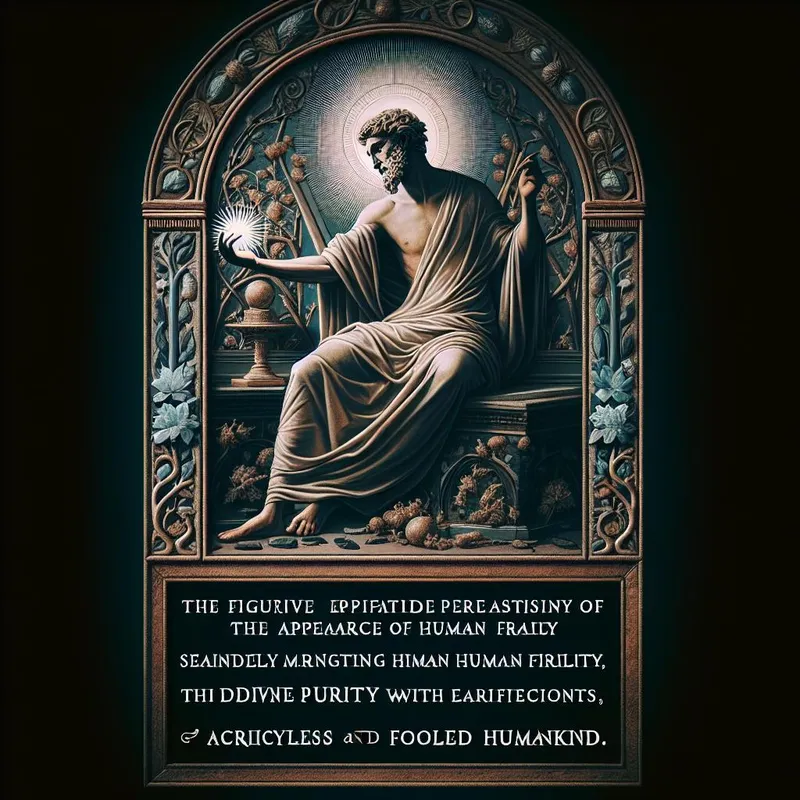
"Unveiling Jesus' Sinful Flesh Likeness: A Profound Christian Revelation"
Posted on 06 June 2024
Jesus in the Likeness of Sinful Flesh
The concept of Jesus coming in the likeness of sinful flesh is found in Romans 8:3–4. This passage states that God sent His own Son, Jesus, in the likeness of sinful flesh to be a sin offering. By doing this, God condemned sin in the flesh and fulfilled the righteous requirement of the law. To fully understand what it means for Jesus to come in the likeness of sinful flesh, we need to define a few terms and explore their significance.
The Meaning of "The Flesh"
When the Bible refers to "the flesh," it generally refers to the human tendency to sin that we all inherited from Adam. In other words, it represents our fallen nature. When Adam and Eve rebelled against God's commandment in the Garden of Eden, sin entered the world, corrupting everything. As descendants of Adam, we have all inherited this fallen nature, and therefore, we are all born as sinners.
The Likeness of Sinful Flesh
The word "likeness" means resemblance or similarity. It signifies that something is not identical in substance or nature but shares a resemblance or appearance with something else. In the case of Jesus, He took on the likeness of humanity by becoming fully human while retaining His divinity. He entered into our human experience, living the life we live, suffering as we suffer, and growing as we grow. However, unlike every other human being, Jesus did not inherit a sin nature because He did not have an earthly father. His conception was miraculous, with Mary being overshadowed by the Holy Spirit (Luke 1:35).
Jesus as Our Substitute
Jesus came in the likeness of sinful flesh to be our substitute. He willingly took on physical pain, emotional rejection, and spiritual separation from God. He lived a perfect life without sinning and maintained perfect fellowship with God. By doing so, He presented Himself as the final sacrifice sufficient to pay for the sins of all humanity. Jesus' sacrifice on the cross and His resurrection provide the means for us to receive forgiveness and reconciliation with God.
Receiving the Gift of Salvation
To receive the gift of salvation, we must acknowledge Jesus as our personal substitute. We come to Him in faith, recognizing that His sacrifice paid for our sins in full. Through faith in Jesus, our sinful flesh is crucified with Him, and we are set free to follow the guidance of the Holy Spirit and live in obedience to God. As Christians, we have Christ's death and resurrection credited to our account, wiping out the debt we owe to God.
Why This Matters
Understanding that Jesus came in the likeness of sinful flesh is crucial because it reveals God's plan for our redemption. Jesus' sinless life and sacrificial death provide the way for us to be reconciled with God and experience eternal life. It underscores the seriousness of sin and highlights the incredible love and mercy of God in providing a substitute for us.
Think About It
Reflecting on Jesus coming in the likeness of sinful flesh should lead us to ask ourselves some important questions:
- How does knowing that Jesus came in the likeness of sinful flesh impact your understanding of His sacrifice?
- What does it mean for you personally that Jesus became your substitute?
- How does this truth inspire you to live differently and follow Christ more closely?
As we ponder these questions, let us remember the immense love and grace displayed through Jesus' willingness to take on human flesh, suffer, and die for our sins. May it deepen our gratitude and compel us to live lives that honor Him.
